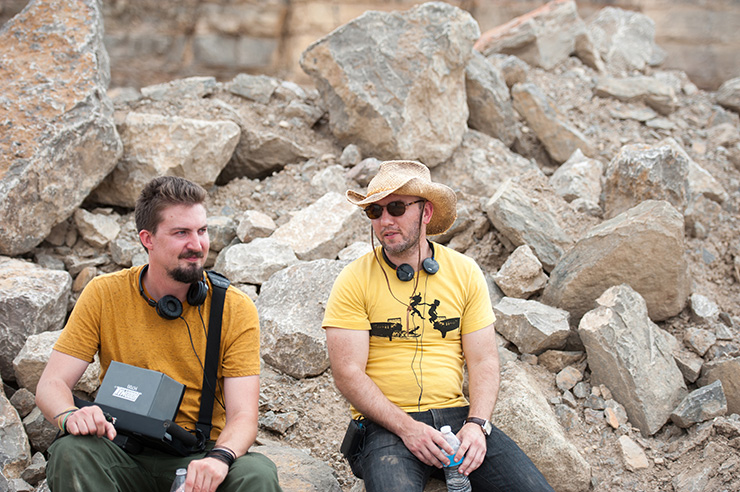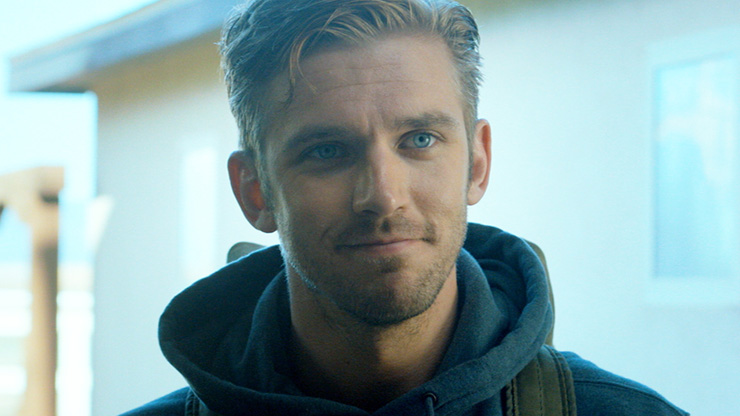The gaze bespeaks hunger. Dan Stevens’ intense baby blues take over the canvas of the movie screen at the beginning of The Guest, and the effect is not so much unsettling as it is seductive. “I am going to do very bad things,” the look seems to say, “and I want to take you along for the ride.”

Photographer: Desiree Asher
(L-R) Director ADAM WINGARD and Screenwriter SIMON BARRETT on the set of the action thriller THE GUEST, opening in September.
If Stevens, best known to television viewers on both sides of the Atlantic as Matthew Crawley on the hit PBS series Downton Abbey, wanted to shatter his Masterpiece Theater persona in his latest screen venture, mission accomplished. As “David,” the enigmatic stranger who pays a visit to the family of a deceased Army soldier and claims to have served alongside him, the London native pulls off a 180-turn from his dashing, kindhearted TV alter ego. Even though he appears to genuinely care for this dysfunctional, New Mexico-based household, going so far as to defend the dead soldier’s little brother Luke (Brendan Meyer) from bullies at school, his sister Anna (The Bling Ring’s Maika Monroe) can’t help but sense there’s something dangerously off about this (admittedly hunky) guy who gloms onto her family after he is asked to stay for a while.
The man sitting across from this reporter, accompanied by The Guest’s writer-director team of Adam Wingard and Simon Barrett, doesn’t really remind me of either aforementioned role. It’s a sunny Tuesday afternoon in early September, and Dan greets me warmly, a full head of dirty blond hair, a disarming smile … and an ill-advised jean jacket, but let’s not dwell on that. “I went to the beach very briefly last night, and I got a Cuban coffee this morning,” he tells me, clearly bummed out that he’s only spending a day in Miami.
The promotional tour stop is actually the first South Florida visit for all three of The Guest’s guests. “My view of the city is from a hotel room, unfortunately,” laments Adam. “I’m from Alabama myself, so I’ve spent a lot of time in Florida and stuff, but I’d never actually been here.”
“I wish we were here more than 20 hours,” says Simon. “Well, we’ve seen the city driving to and from our screening and outside of our hotel. I like very much what I’ve seen.”
I wonder what it was about Barrett’s screenplay that drew Dan to this project. Was it the titular character’s seemingly contradictory nature? Dan says he was intrigued by the way “David” deals with every situation he encounters as a crisis to resolve. “I think the initial premise is that ’David’ is an excellent soldier, and he works very much on a mission-by-mission basis. He’s either given or gives himself certain tasks to fulfill, and he’s pretty expedient,” he says.
After all, the character, whose name is intended to remain in quotations throughout, even in the film’s end credits, does become an avenging angel to this shell-shocked family, at least until more lethal, sinister behavior emerges. “His attitude toward each individual, particularly the family is, I guess, a caring one. He wants to help them, and he fulfills those missions,” says Dan. “I think he’s also very good at controling the flow of information. That’s the way a lot of those military men are, you know, the way that they talk.”

Dan Stevens.
The Guest may court a more mainstream audience than Wingard and Barrett’s previous collaboration, the fiendishly clever slasher flick You’re Next, but their latest effort is bolstered by the biting social satire and political jabs admirers of their work have come to expect. Their target this time around? The way America treats those men (and women) in uniform whose exposure to the atrocities of war may have left them with severe psychological scars. “There’s an interesting metaphorical standpoint to a guy who just shows up to help people and ends up being perceived as a threat to them, in terms of recent conflicts,” says Simon. “So we were able to comment on the military-industrial complex.”
“The character of ’David’ is really a sort of metaphor for PTSD,” Adam pipes in, “and a good horror film is rooted in real-world metaphors.”
Adam’s eyes light up when I ask him about The Guest’s eclectic soundtrack, which allows him to gush about the B movies he wanted to evoke and pay homage to, in particular the work of John Carpenter, whose presence is felt throughout the film. “The starting point really was the John Carpenter music and the Brad Fiedel score for Terminator 1 and 2, and that kind of stuff. I knew I wanted to encapsulate a sort of modern take on the eighties kind of vibe,” he says, “I didn’t want the movie to be a parody of an eighties film, but I wanted to inhabit the same head space that those films had.”
As in many of the films in its DNA, The Guest opts to portray its main character as an unstoppable killing machine, an unrelenting bogeyman who just keeps on coming. Watching the film, I wondered how Adam and Simon reconciled this aspect of “David” with the more dramatic – and genuinely touching – moments that kicked the story into gear. When I ask the filmmakers whether they’re concerned viewers who have lost a friend or family member in combat might feel they’re exploiting the ways post-traumatic stress disorder can ruin real lives, the room grows quiet as the filmmakers let the question sink in.
Simon goes first. “We always take our characters very seriously. I mean, it’s true that we’re making a fun genre movie here, but we’re not really going to be poking fun at the characters, and we treat them like human beings whose lives matter,” he says.
“I think sometimes by using a tragic real-world premise like this and then exploring it in a way that gets more fantastical and more fictional, it can be be actually kind of fun and interesting,” Simon adds.
Adam also defends his depiction of his characters, arguing that exploitation knows no genre boundaries. “If you’re just doing a depressing movie of a vet who has PTSD, I feel like that’s just as exploitative as a horror film that’s doing it as well. The only difference is, like, a drama might be exploiting it for trying to get awards and stuff like that.”
One of the ways The Guest is rooted in real-world concerns is in its portrayal of the bullying Luke experiences at school, which includes the use of the word “faggot” as a blunt weapon. When asked whether it’s OK to use such inflammatory, hurtful language, even with the best intentions in mind, Simon says, when writing the screenplay for The Guest, he felt he needed to show the harsh reality a shy, friendless teen like Luke would have faced going to school in a small town. “As a screenwriter, there’s nothing more annoying or condescending than someone commenting on something that they have no personal knowledge of, but at the same time, that’s an issue that we did want to address, and it’s something that, I wasn’t maybe bullied in that specific way, but I witnessed kids who were, and I got into my share of fistfights in high school, as did most kids growing up in a small town in Missouri who wanted to make horror movies for a living,” he says.

LEFT: Dan Stevens. MIDDLE: Maika Monroe, Dan Stevens. RIGHT: Simon Barrett, Adam Wingard.
“Shying away from the language that would realistically be used in that environment, just because I’m not gay, would have felt wrong and cheap to me,” he continues.
So, who among this trio is brave enough to talk about “David” the sexual animal? The topic is relegated to one scene in The Guest, in which Stevens’ character, who has accompanied Anna to a house party, is in bed with one of her coworkers as she tries to, um, get a rise out of him. But we have no liftoff.
I could sense Dan is trying to come up with an appropriately delicate response. “David’s sexuality was kind of left deliberately ambiguous, and we didn’t want to prescribe, necessarily,” he says.
Be that as it may, in the aforementioned scene, “David” seems unable to get an erection unless he’s on top of his sexual partner. “I felt that that was more, that scene played more on his mission aesthetic. Because him seducing her was part of him charming over Anna, so it was almost like he forgot to get an erection,” says Adam.
And it’s Simon for the win. “It was more about showing the level, that he kind of forgot to turn himself on, cause he was thinking of, like, the exits and the windows and what in the room he could turn into a weapon, because he’s not reacting like a human being would to this very attractive girl on top of him,” he says. “So there’s ambiguity there, and there’s layers to what he does within that scene, but the primary one was that we wanted to show he isn’t responding ’normally’ until he reminds himself to, in that he has that ability, which, of course, is unique to that character.”
Simon’s still mulling the question over. “That’s an interesting question. I’ll have to think about that one a bit more.”
Spoken like a filmmaker who knows a thing or two of playing with the audience’s expectations, something The Guest takes to disquieting extremes.
The Guest is now showing in theaters in wide release.
 MAIN MENU
MAIN MENU

